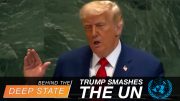The mainstream media have been quick to write off the recent Russian spy scandal as an inconsequential matter, a case of the gang that couldn’t shoot straight. These were bumbling wannabe spies who didn’t obtain anything of value, goes the standard narrative. (See, for instance, here, here, here, and here.) Reporters and commentators seem to see nothing amiss in the snap decision by the Obama administration to send the ring of deep-cover moles back to Russia only 11 days after their arrests, despite the fact that the FBI had sunk thousands of man-hours and millions of dollars into the investigation over the course of a decade.
Undoubtedly, one of the individuals calling the shots on this matter for the administration is Michael McFaul, President Obama’s Special Assistant for National Security Affairs and Senior Director of Russian and Eurasian Affairs at the United States National Security Council. This is interesting in that Dr. McFaul appears to be a close associate of — and a Facebook friend of — Anna Dvornikova, president of the American Business Association of Russian-speaking Professionals (AmBAR), and Anna Dvornikova, in turn, is Facebook friends with Anna Chapman, the most famous of the spies that were deported on July 8. The same journos that reduced the serious national security implications of the spy scandal to tabloid-style reports on Anna Chapman — the "sexy spy" and "the Russian hottie" — have failed to show any interest in probing Dr. McFaul’s connections to the spy ring.
Of course, even to broach the subject of a possible McFaul-KGB/SVR connection, is to invite the reflexive charge of "McCarthyism" from the reactionary "liberals" in the media and academe. However, the unfolding history of the past five decades, along with the release of the Venona intercepts and the limited opening of the archives of the KGB and the intel agencies of its Warsaw Pact subsidiaries, have fully vindicated Sen. Joseph McCarthy.
In fact, the evidence now available shows that far from exaggerating the Soviet threat , McCarthy actually underestimated the extent of the communist penetration of the federal government.
The foregoing is not to suggest that Professor McFaul is a Russian agent, but it does suggest that there is more than ample reason for investigative journalists (not to mention congressional committee investigators) to take a serious look at his connections and activities, especially as they relate to the curiously expedited deportation of the Russian spy-ring members. And it is not simply the matter of his being a Facebook friend of Anna Chapman. It’s not even simply a matter of his connections to Anna Dvornikova and her AmBAR comrades, and their numerous ties to Putin’s KGB/SVR apparatchiks, although those ties certainly should more than justify a thorough inquiry. The causes for concern are much broader and deeper than that.
McFaul, a principal architect of Obama’s "reset" agenda with Russia, was the administration’s top representative this past May at a venture capital summit organized by Dvornikova and AmBAR to draw top U.S. high-tech investors to Russia. The program, headlined by Russian President Dmitry Medvedev, lured 22 of the "big names on the US venture capital market, collectively managing more than $60 billion in more than 6,000 high-tech companies," according to the Moscow News.
A report on the summit on AmBAR’s web page says the U.S. delegation included "leaders from such well-known funds as Accel Partners, August Capital, Atlas Venture, Bessemer Venture Partners, Canaan Partners, Sofinnova Ventures, JK&B Capital, Emergence Capital, Mohr Davidow Ventures, Domain Associates, Wilson Sonsini Goodrich & Rosati (law firm), Asset Management Company, Alloy Ventures, EDventure, Siguler Guff & Company, Index Ventures, Almaz Capital Partners, Draper, Fisher & Jurvetson, Trident Capital and Wellington Partners."
The AmBAR report continues:
The aggregate investment portfolio of these companies includes more than six thousand brands, including such famous names as Microsoft, Oracle, Dell, Cisco, Intuit, Symantec, Apple, Redhat, Juniper, Facebook, Ebay, Hotmail, Baidu, Skype, Verisign, Veritas, Gartner Group , Teva, Amgen, Applied Biosystems, Biogen, Idec, among others.
McFaul has been working with AmBAR’s Dvornikova and Vladislav Surkov, advisor to Russian President Dmitry Medvedev, to convince America venture capitalists and high-tech companies of the benefits to be gained from investing billions of dollars to develop Skolkovo, the new Russian Silicon Valley. McFaul and Surkov co-chair a U.S.-Russian working group commonly referred to as the McFaul-Surkov commission to push U.S.-Russian convergence on "nuclear energy and security, arms control, fighting terrorism, economic relations, health, energy, and the environment, and civil society."
"Instruments of State Policy"
AmBAR is joined at the hip with RUSNANO (the Russian Corporation of Nanotechnologies) a Kremlin-owned-and-controlled company that cosponsored the Moscow venture capital summit with AmBAR. RUSNANO is headed by former Communist Party apparatchik Anatole Chubais, who oversaw the phony "privatization" program that destroyed the savings and livelihoods of tens of millions of Russian citizens. Chubais’ program also transferred state assets into the hands of fellow Communist Party functionaries and KGB operatives who became Russia’s new billionaire oligarchs. Despite his false reputation in the West as a "free market" advocate, Chubais has managed to stay in the good graces of Vladimir Putin, as evidenced by his plum job at RUSNANO.
Here is how RUSNANO is described by its own corporate PR people in a company profile for the Nanotech Conference and Expo 2009 in Houston:
The Russian Corporation of Nanotechnologies (RUSNANO) was established under the Federal Law _ 139-FZ in September 2007. The mission of RUSNANO is to advance Russia into the pool of the world’s leaders in the field of nanotechnologies…. The Corporation has 130 billion rubles (about $5 billion) under management, provided solely by the Russian Government.
The company profile goes on to say:
RUSNANO is an instrument of state policy in the field of nanotechnology, with the main tasks of: gaining a substantial part of the world’s market share of nanotechnology-based products.
As "an instrument of state policy," RUSNANO is as much a tool, or agent, of "Moscow Center" (command headquarters for the KGB/FSB/SVR) as the recently apprehended Russian sleeper agents. It should not be necessary to emphasize this point, but unfortunately, the American and European press have been almost as quick as Putin’s own controlled media organs to trivialize, lampoon, and politicize the Russian spy-ring arrests.
Payoff: Building Russia’s War Machine
The McFaul-Surkov efforts paid off handsomely in June with Russian President Dmitry Medvedev’s trip to the United States, during which he signed an historic agreement with the Massachusetts Institute of Technology (MIT) "for collaboration in education and research in Russia."
Even more important was Medvedev’s visit to California’s Silicon Valley, where, among other things, he inked a $1 billion deal with Cisco Systems, and met with Apple’s Steve Jobs (who presented him with one of the first iPhone 4 units).
The big deal, however, was the announced $4 billion sale of 50 Boeing Next-Generation 737 jet airplanes to Russia. President Obama presented this as a win-win deal that could create 44,000 American jobs while boosting efforts to build a peaceful partnership with our former adversary. But the buyer of the new Boeings is Rostechnologii (Russian Technology State Corporation), which, like RUSNANO is an instrument of state policy. That is, it is an agency of the Russian government run by Vladimir Putin’s KGB/FSB nomenklatura, and Putin expects to get something more than a few dozen commercial jets from the deal. That much is evident from the little-noticed announcement on June 24 by Boeing and Rostechnologii explaining that this is part of a 30-year $27 billion "strategic partnership" between the two corporations.
"This contract is another milestone in Boeing’s longstanding relationship with Russian Technologies/VSMPO-AVISMA — our strategic partner and supplier in Russia," said Jim Albaugh, Boeing Commercial Airplanes president and chief executive officer, as reported by Finchannel, a Russian financial news company. FinChannel reports further that:
"In July 2009, Boeing and VSMPO-AVISMA opened a 50/50 equity joint venture, Ural Boeing Manufacturing (UBM), based in Verkhnyaya Salda, Russia. UBM is a new, state-of-the-art facility that machines titanium forgings for the world’s most technologically advanced airplane — the 787. Boeing forecasts that over the next 30 years it will spend as much as $27 billion on Russian titanium, aerospace design-engineering services and a variety of other services and materials," Boeing said.
Boeing, however, is not simply buying raw titanium from Russia; it is building Russian Technologies/VSMPO-AVISMA into a premier world producer of high-tech titanium forgings, essential for jet and rocket engines, missiles, jet wings and airframes, helicopters, satellites and many other military applications. "Boeing also serves," notes the Finchannel article, "as an advisor to the Sukhoi Superjet 100 airplane program." Sukoi, of course, was the Soviet Union’s principal maker of bombers and fighter jets throughout the Cold War, and it continues in that same capacity today — aided by Boeing and other U.S. high-tech companies.
The Boeing-Russian Technologies/VSMPO-AVISMA deal may be good for Boeing executives and stockholders, but any benefit to the U.S. economy and Boeing employees will be short-lived. As with the other U.S.-Russian joint ventures in the Skolkovo program, the Boeing deal appears to be designed as a giant outsourcing operation. Over the past couple of decades many employees of American corporations have found themselves "training their replacements" — usually Chinese or Indians, who ended up taking over the American employees’ jobs at new corporate facilities in China or India. Boeing employees can expect the same experience, except in their case the replacements will speak Russian.
Of course, American jobs are not the only thing, or the most important thing, at stake. The national security implications are staggering. However, for Michael McFaul, Hillary Clinton, and other globalists pushing for a "reset" with Russia, "national security" is passe’. We must now think, talk, and plan in terms of "global security," they say, with Russia as our strategic partner. Within their own globalist circles, they refer to this as "convergence," a process through which they intend progressively to intertwine the American and Russian (and Chinese) economies to such an extent that political convergence, or union, will follow ineluctably. The massive Skolkovo project is a major part of the convergence agenda. Vladimir Putin laid the foundation stone in a ceremony in 2006 for the $300 million initial phase of the project; Medvedev has been carrying it forward into the next phase.
Dr. McFaul is a major player in the convergence game, with top connections at the Council on Foreign Relations (CFR) — where he is a member, as well as a regular contributor to the Council’s journal, Foreign Affairs, and a speaker on Council programs — and the Carnegie Endowment for International Peace, two of the principal globalist organizations pushing for world government for much of the past century. For two years, before joining the Stanford University faculty in 1995, McFaul lived in Russia as a senior associate of Carnegie Moscow Center, which works closely with the Gorbachev Foundation and other Russian institutions operating at the behest of the KGB/FSB. He serves on the board of directors of the Firebird Fund, which manages a group of funds of publicly traded equities of Russian and Eastern European companies. He also sits on the advisory board of the Eurasia Foundation a major conduit of funding from Western governments and foundations for Russians and Eastern Europeans claiming to be reformers. The U.S. Agency for International Development (USAID), the European Union, the Carnegie Corporation, and George Soros’ Open Society Institute are major sources of the Foundation’s funding. All of these connections (and many others) have provided numerous excellent opportunities for McFaul to become entangled in operations of the KGB/FSB/SVR. Did any of these connections have an influence on the Obama administration’s curious decision to hastily expel the 10 Russian spies? Did they influence decisions that allowed an 11th Russian agent to get away and a 12th agent to be deported quietly on July 12, four days after the others?
Those are fair questions concerning matters at the very heart of America’s national security. The fact that Dr. McFaul is "highly respected" in certain powerful circles is not a valid argument for immunity. Alger Hiss, perhaps the most notorious high-level Soviet mole to penetrate our federal government, was likewise "highly respected" in the same powerful circles. In fact, like McFaul, Hiss was an upper-echelon member of the CFR and a top factotum (president, actually) of the Carnegie Endowment. And the same media chorus (the New York Times, The Nation, Time, CBS, NBC, et al.) that, for decades, doggedly, fatuously, and disingenuously defended and covered for Hiss (while simultaneously smearing those who pointed to overwhelming evidence of his guilt), are today singing the same song, smugly dismissing the current spy scandal as nothing, and telling us to "forget it" and "move on."
We mustn’t allow, they insist, a minor thing such as an extensive, long-term, hostile intelligence offensive to undermine this "Kumbayah moment," this chance to join hands with Putin and Medvedev and "reset" U.S.-Russian relations.
Related content:
U.S., Russia "Reset" the Convergence Agenda
Microsoft Plugged Into Russian Espionage
FBI Busts Russian Espionage Network
Spy Escape in Cyprus Highlights Russia’s Growing Clout in Mediterranean
Why the Rush to Send Russian Agents Back?
Dangerous Connections: NBA and the KGB
Russia, China Spies Belie "End of the Cold War"
Singing With the Spies: Putin’s Image Makers Strike Again
Photo of Russian spy Anna Chapman: AP Images




